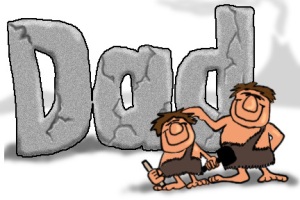 Last Sunday was Fathers’ Day. A few weeks beforehand, the shops started to fill with cards, and then with despondent children of all ages searching for the perfect card to sum up all they felt about their fathers.
Last Sunday was Fathers’ Day. A few weeks beforehand, the shops started to fill with cards, and then with despondent children of all ages searching for the perfect card to sum up all they felt about their fathers.
As I joined them in trawling the aisles, rejecting card after pathetic card, I started thinking about how our society portrays manhood in general and fatherhood in particular. Well, continued, rather than started, since it’s one of those issues which lurks around in the back of my mind and breaks the surface from time to time.
It was touched upon briefly in the CS Lewis quote I used last week, in contrast to the image of womanhood. Men were described as:
“a huge, dim multitude of creatures pitifully childish and complacently arrogant; timid, meticulous, unoriginating; sluggish and ox-like, rooted to the earth almost in their indolence, prepared to try nothing, to risk nothing, to make no exertion, and capable of being raised into full life only by the unthanked and rebellious virtue of their females.”
Little has changed in the 60-odd years since Lewis wrote that, has it? Think about the sit-coms, soaps and dramas on TV. Men are ridiculed for being lazy, emotionally-stunted and incompetent. Alternatively, they are depicted as brilliant but socially inept, or as brutal and heartless.
They are rarely self-aware, let alone aware of what’s going on around them, they blunder through life and, for the most part, are only successful if a woman nags, manipulates or tricks them into doing things her way.
I think in part this has been a backlash by women – and by men feeling guilty – in response to the perception that throughout history men have been the successful ones, while women have been downtrodden and ignored. But in large part I suspect it is just the way things have always been, and the social roles of the Victorians have just provided women with a good excuse.
It is all-but impossible to discern the truth of the matter, of course, since our tellings of history are shaped by our perceptions of the present, though various episodes in the Bible seem to suggest that women have always been willing and able to manipulate their menfolk and persuade them to do something they never intended to (think Sampson and Delilah, Abram and Sarai (particularly concerning Hagar), Adam and Eve), and may well have then belittled them for it.
So what does that have to do with Father’s Day cards? Well, it means that it is almost socially unacceptable to produce a card that thanks fathers for their leadership, their strength, their reliability, their love, their protection and their provision.
If you were an alien landing on earth last week, and learning about fatherhood from the cards available, you’d have concluded that a father is someone who:
– plays golf, drives a vintage car, or goes sailing (and likes old-fashioned oil paintings of said activities)
– drinks beer
– has lots of money, but rarely parts with it (though if you understood irony, you might pick up that dads are simply a constant source of cash for their children)
– possibly likes tools or gardening
They don’t contribute anything to home or family life (occasionally they may cook, but only on a barbecue, and usually with disastrous results), in fact, all their activities take them out of the home and away from the family.
I managed to find a card that celebrated my dad’s sense of humour, his intelligence and his ability to make or mend anything, which was a start. It couldn’t quite bring itself to celebrate his wisdom, his self-sacrifice, his patience or his generosity though. It didn’t thank him for being home for dinner with the family every evening. It didn’t thank him for teaching us love, boundaries and discipline. It didn’t envision a father who was involved, engaged, loving and giving.
Thanks Dad, for being a great example of fatherhood and manhood.
Come on creative-types, write TV and films roles that show what manhood can and should be about. We need great role models, who give young boys something to aspire to. And we need card companies to bring out some great designs of cards which celebrate the richness of fatherhood. You’ve got a year: ready, steady…go!


on Aug 25th at 12:50 pm
[…] calls this trend “the [Homer] Simpsonisation of fathers”, and his analysis chimes with this post I wrote a couple of Fathers’ Days […]